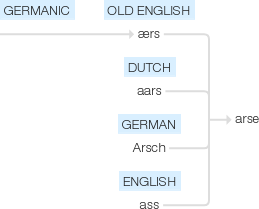Arse
Old English ærs, of Germanic origin; related to Dutch aars and German Arsch . See also ass2.
wiktionary
From Middle English ars, ers, from Old English ærs, ears, from Proto-West Germanic *ars, from Proto-Germanic *arsaz (compare Dutch aars and German Arsch), from Proto-Indo-European *h₃érsos(“backside, buttocks”) (according to Julius Pokorny and Carl Darling Buck).
etymonline
arse (n.)
"buttocks, hinder part of an animal," Old English ærs "tail, rump," from Proto-Germanic *arsoz (source also of Old Saxon, Old High German, Old Norse ars, Middle Dutch ærs, German Arsch "buttock"), from PIE root *ors- "buttock, backside" (source also of Greek orros "tail, rump, base of the spine," Hittite arrash, Armenian or "buttock," Old Irish err "tail").
To hang the arse "be reluctant or tardy" is from 1630s. Middle English had arse-winning "money obtained by prostitution" (late 14c.). To turn arse over tip is attested by 1884, along with the alternative arse over tit.
Every scrap of Latin Lord Edgecumbe heard at the Encaenia at Oxford he translated ridiculously; one of the themes was Ars Musica : he Englished it Bumfiddle. [Horace Walpole to the Countess of Upper Ossory, Aug. 9, 1773]
